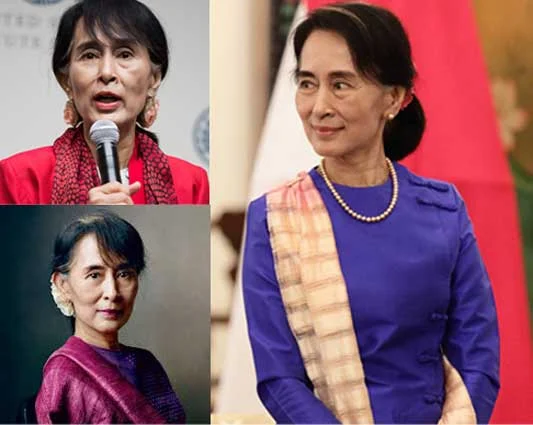Short essay on life of Aung San Suu Kyi
Short essay on life of Aung San Suu Kyi - AungSan Suu Kyi or AungSan Daw Suu Kyi was born in Rangoon on 19 June 1945. He is an activist of women's prodemocracy of Burma at the same time the leader of the National League for Democracy. His father, AungSan negotiated independence from the United Kingdom in 1947, and was killed by a rival in the same year.
On the death of his father, he grew up with his mother, Khin Yi, as well as two of her brothers, Aung San Lin and Aung San U in Yangon. However, AungSan Lin drowned in a pool while Suu Kyi was eight years old so that at that time he only has one brother. Suu Kyi studied at a Catholic school the United Kingdom in Burma, where he spent most of his childhood.
After his father was killed on July 19, 1947, his mother later became a social movement figures, leading a national planning and social policy. Next, in the 1960s, her mother went to India to meet Burma's Ambassador to India, and since then Suu Kyi continued her education at secondary schools and colleges Shi Ram.
Then in 1964 he continued his education at the University of Oxford, United Kingdom and obtained a B.A. in philosophy, politics, and Economics in 1967.
 |
| Aung San Suu Kyi |
A glimpse of the figure AungSan Suu Kyi
During his time in the United Kingdom, Suu Kyi lived with his adoptive parents, that is, nobleman Lord Gore-Booth, former United Kingdom Ambassador to Burma and India, Higher Committee with his wife. There he became acquainted with Michael Aris, a student who majored in Tibetan civilization, the man who would become her husband.
In 1969, he returned to New York to further her studies and stayed with the friend of the family named Ma Than E, a staff at the United Nations who at that time headed by Uthant from Burma.
After completing his education at Suu Kyi join in the United Nations Secretariat as Assistant Secretary, Advisory Committee of financial administration. Evenings and weekends, she became a volunteer at one of the hospitals, help patients who come from a poor family to teach them reading and friendly.
After the official is married to Michael Aris on 1 January 1972, Suu Kyi stood for the husband who went to Bhutan to become a teacher for the Royal family of Bhutan in the Himalayas and the Department translator.
While Suu Kyi herself worked as a researcher at the Ministry of Foreign Affairs of the Kingdom of Bhutan. A year later, they returned to London and gave birth to his first son of Suu Kyi, Alexander.
Suu Kyi gave birth to his second son, Kim, in 1977. At that time Suu Kyi has started writing, researching a biography of his father, and to accompany her husband to do studies on the Himalayas.
From the results of the research the biography of his father in 1984, Suu Kyi published a book entitled "Aung San" in a series of Asian leaders issued by the Publisher UNiversitas Queesland.
For reading the young Suu Kyi published a book titled "Let's Visit Burma", as well as books about Nepal and Bhutan in the same series, published by Burke publishing company, London.
In 1985, Suu Kyi had the opportunity to visit the Center for Southeast Asian Studies at Kyoto University, a place of research visits her father in Japan. In his visit that he took her youngest son, Kim. In the meantime his first son Alexander along with his father. Michael Aris, attend friendship programs at an Institute in Simla, India.
After Japan, Suu Kyi and Kim joined forces with Michael and Alex in Simla, India in 1987. They then returned to London to accompany the mother underwent cataract surgery.
In 1988 Suu Kyi along with her husband and her two sons went to Rangoon are told because he was that his mother Daw Khin Kyi had a stroke. They accompanied her mother to the hospital and took him to a university environment near Inya Lake in Rangoon.
The return of Suu Kyi to Rangon at that time coincided with the resignation of General Ne Wen, leader of the Burmese dictators since 1962 to 1988. Thousands of demonstrators took to the streets protesting against their dictator leader, while the Government responded with violence that resulted in the death of thousands of people.
Read also: The action of political maneuvering Suu Kyi
Read also: The action of political maneuvering Suu Kyi